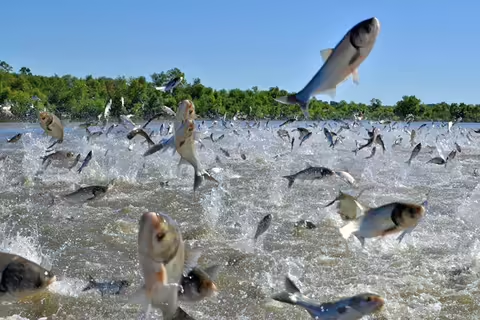What lurks under the surface? Aquatic invasive species may seem like sea creatures from the movies, but the impact of these introduced plants and animals on Lake Michigan is no fiction. From blood-sucking sea lamprey to jumping silver carp, many aquatic invasive species look and act like...
Aquatic Invasive Species
Large River Ecologist.
Aquatic invasive species negatively impact both our economy and the environment from the Great Lakes system to Illinois lakes, rivers, and streams. Aquatic invasive species can be non-native fish, plants, and invertebrates, such as mussels that are introduced and spread through a variety of ways including those associated with boaters, anglers, water gardeners, aquarium hobbyists, and educators.
Illinois' centralized location and extensive transportation networks provide many ways for pests to arrive. Climate change also creates opportunities for species to become invasive as they seek new habitats.
Unregulated Invasive Species of Concern in Illinois that are aquatic include Flowering rush, Brazilian egeria, Hydrilla, Purple loosestrife, Eurasian watermilfoil, Curlleaf pondweed, Narrowleaf cattail, Spiny water flea, Zebra mussel, Asian carp, Chestnut lamprey, Round goby, and Asian carp.
Find more information about aquatic invasive species from the Illinois Natural History Survey.
Before you leave a body of water after boating or fishing, always remove, drain, and dry:
- REMOVE plants, animals, and mud from all equipment. Mud and plant fragments can also hide aquatic invasive species that are too small to be seen with the naked eye.
- DRAIN all water from your boat and gear. Boaters should ensure plugs are pulled from bilge and live wells before leaving a waterway. Bait bucket water should be drained on land.
- DRY everything thoroughly with a towel. All equipment that comes into contact with water should be wiped off and dried with quick-dry towel. If possible, dry everything for five days before entering new waters.
Clean other equipment as necessary. Waders and boots should be scrubbed and rinsed with tap or well water. If possible, use hot or high-pressure water to clean your equipment. Using a car wash for your boat and trailer is a great alternative. Full-strength white vinegar or a solution of ¼ cup bleach per gallon of water can be used to disinfect equipment and confined spaces like live wells.
